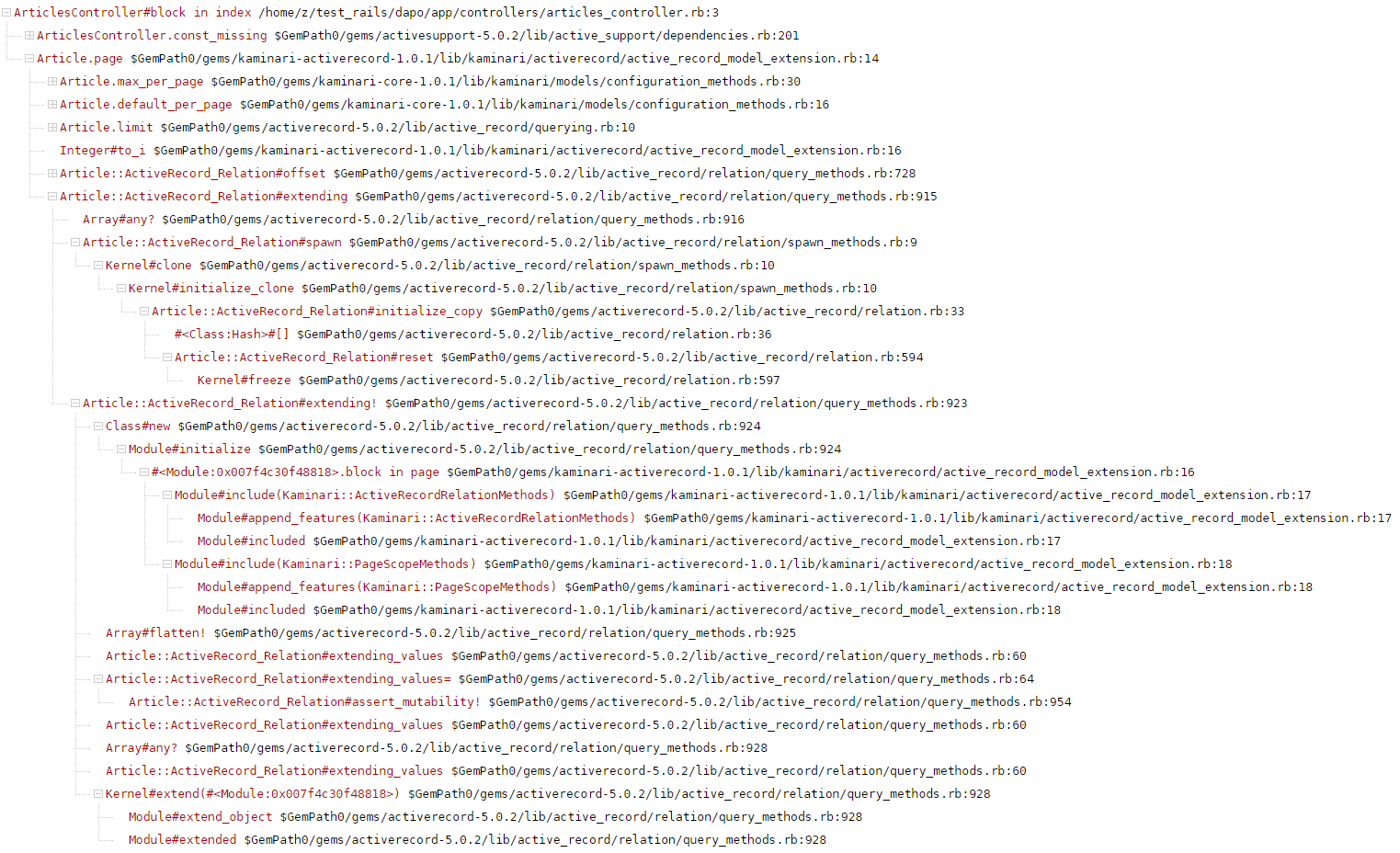kaminari浅析
如无意外,kaminari就是monkey patch了actionview和activerecord
require 'kaminari/core'
require 'kaminari/actionview'
require 'kaminari/activerecord'对activerecord的patch基本上就是include Kaminari::ActiveRecordModelExtension
# frozen_string_literal: true
require 'kaminari/activerecord/active_record_relation_methods'
module Kaminari
module ActiveRecordModelExtension
extend ActiveSupport::Concern
included do
include Kaminari::ConfigurationMethods
# Fetch the values at the specified page number
# Model.page(5)
eval <<-RUBY, nil, __FILE__, __LINE__ + 1
def self.#{Kaminari.config.page_method_name}(num = nil)
per_page = max_per_page && (default_per_page > max_per_page) ? max_per_page : default_per_page
limit(per_page).offset(per_page * ((num = num.to_i - 1) < 0 ? 0 : num)).extending do
include Kaminari::ActiveRecordRelationMethods
include Kaminari::PageScopeMethods
end
end
RUBY
end
end
end由此获得page方法,它所做的就是帮你做limit和offset,并extend一些方法

extending方法来源于ActiveRecord::QueryMethods,它会mixin到Relation中
它用途就是动态生生module然后extend当前Relation
def extending(*modules, &block)
if modules.any? || block
spawn.extending!(*modules, &block)
else
self
end
end
def extending!(*modules, &block) # :nodoc:
modules << Module.new(&block) if block
modules.flatten!
self.extending_values += modules
extend(*extending_values) if extending_values.any?
self
endextending与inlcudes、joins之类同属于MULTI_VALUE_METHODS(暂不明为何这样归类)
module ActiveRecord
class Relation
MULTI_VALUE_METHODS = [:includes, :eager_load, :preload, :select, :group,
:order, :joins, :left_joins, :left_outer_joins, :references,
:extending, :unscope]extending_values定义如下
module ActiveRecord
module QueryMethods
# ...
FROZEN_EMPTY_ARRAY = [].freeze
Relation::MULTI_VALUE_METHODS.each do |name|
class_eval <<-CODE, __FILE__, __LINE__ + 1
def #{name}_values
@values[:#{name}] || FROZEN_EMPTY_ARRAY
end
def #{name}_values=(values)
assert_mutability!
@values[:#{name}] = values
end
CODE
endview中paginate的大概执行过程如下

它使用total_count来计算页码
module Kaminari
module Helpers
module HelperMethods
def paginate(scope, paginator_class: Kaminari::Helpers::Paginator, template: nil, **options)
options[:total_pages] ||= scope.total_pages
options.reverse_merge! current_page: scope.current_page, per_page: scope.limit_value, remote: false
paginator = paginator_class.new (template || self), options
paginator.to_s
endtotal_count就是排除掉limit和offset后的Relation的count(如果已loaded且发现不足一页,则直接返回条数)
def total_count(column_name = :all, _options = nil) #:nodoc:
return @total_count if defined?(@total_count) && @total_count
# There are some cases that total count can be deduced from loaded records
if loaded?
# Total count has to be 0 if loaded records are 0
return @total_count = 0 if (current_page == 1) && @records.empty?
# Total count is calculable at the last page
per_page = (defined?(@_per) && @_per) || default_per_page
return @total_count = (current_page - 1) * per_page + @records.length if @records.any? && (@records.length < per_page)
end
# #count overrides the #select which could include generated columns referenced in #order, so skip #order here, where it's irrelevant to the result anyway
c = except(:offset, :limit, :order)
# Remove includes only if they are irrelevant
c = c.except(:includes) unless references_eager_loaded_tables?
# .group returns an OrderedHash that responds to #count
c = c.count(column_name)
@total_count = if c.is_a?(Hash) || c.is_a?(ActiveSupport::OrderedHash)
c.count
else
c.respond_to?(:count) ? c.count(column_name) : c
end
endcontroller部分的完整trace如下
(view的跑太久了未跑完)
